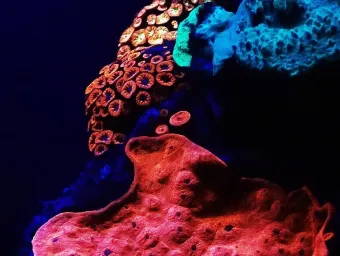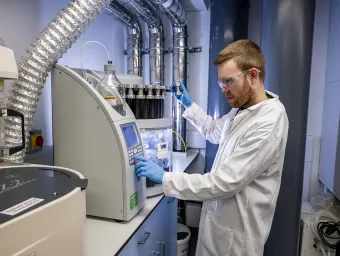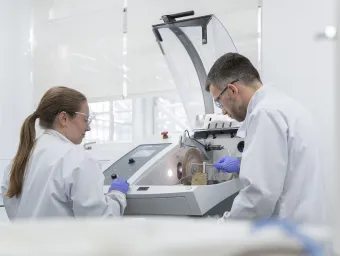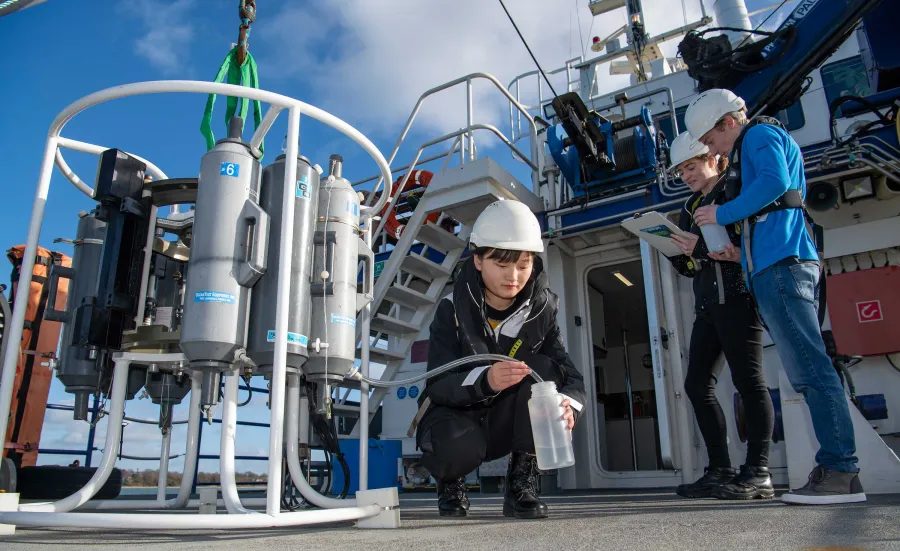-
Global top 50for Earth and marine sciences, geology and geophysics
-
Waterfront campus
Unique location with outstanding facilities including world-leading analytical geochemical laboratories and our own research vessel
-
98%of our research rated world-leading or internationally excellent
Source: Research Excellence Framework 2021, Earth Systems and Environmental Sciences
About us
The School of Ocean and Earth Science is based at the National Oceanography Centre, Southampton. This is where we conduct our research-informed teaching. It's also the location of our 6 research groups:
- Geochemistry
- Geology and Geophysics
- Marine Biogeochemistry
- Marine Biology and Ecology
- Palaeoceanography and Palaeoclimate
- Physical Oceanography
Our scholars and educators join us from all over the world. They carry out fundamental research to explore the Earth’s natural support systems.
The impact of our work includes identifying and implementing nature-based solutions to mitigate climate change impacts. Other examples include sequestering atmospheric CO₂ in marine and terrestrial rock formations and through enhanced rock weathering.
We're educating the next generation of Earth and ocean scientists who’ll be taking on key global challenges. Our suite of undergraduate and postgraduate degrees includes supervision of around 150 PhD students. The School’s educational activities are underpinned with a UK top 10 position in the QS World University Rankings by Subject, 2023.
Our Waterfront Campus is supported by a wide range of scientific facilities and equipment including a research catamaran equipped for coastal and shelf research.
We hold the UK's only Regius Professorship in Ocean Sciences, cementing our position as leaders in ocean science and maritime systems.


Research culture
Our research aims to develop a deep understanding of the whole Earth system. We then apply new findings to secure our planet's future sustainability.
Our top research priorities are:
- reducing uncertainty in knowledge of the climate system and climate variability
- developing and testing solutions for greenhouse gas emission reduction and atmospheric removal
- evaluating the sustainability of natural resources on land and in the oceans
- investigating the impacts of natural change and anthropogenic stressors on marine ecosystems and biogeochemical cycles
- investigating connections between plate tectonics, mantle dynamics and natural hazards
- translating environmental data to knowledge
We transfer our knowledge to industry, public bodies and the third sector through the work of our Stakeholder Advisory Board which includes representatives from:
- the Centre for Environment, Fisheries and Aquaculture Science
- EDF UK
- the Marine Management Organisation
- the Defence Science and Technology Laboratory
- Fugro GB Marine
- the British Geological Survey
At the heart of our research activities is interdisciplinarity. It is woven into our 6 research groups, partnerships with the National Oceanography Centre and multi-disciplinary PhD supervisory teams and training activities. This drives the postgraduate research programmes offered by the:


Facilities and equipment
Our home at the Waterfront Campus is shared with the National Oceanography Centre Southampton. Our many facilities include:
We also maintain our own research vessel to support the School's education and research activities.
Learn more about our extensive facilities and campus with our video tour.
Waterfront Campus tour
Fellowships
We welcome research fellows who want to play a key role in our research across ocean and Earth science. We tackle the most pressing scientific and societal challenges in the natural environment.
We mentor applicants to support and strengthen their applications to major UK and international fellowship programmes. Applicants are paired with a departmental host who will provide:
- mentorship and help with application writing
- introductions to potential collaborators
- introductions to existing fellows
- a tour of our department and world-class facilities
We also provide support letters and costing advice in advance of the application deadlines. Successful applications enter our formal fellowships scheme, which includes:
- training
- access to cutting-edge equipment
- protected time away from teaching and administration responsibilities
- access to PhD studentship supervision
- access to research grant opportunities
- opportunities for permanent positions
If you are interested in applying for a fellowship below, and holding it at Southampton, contact Deputy Head of School Research, Professor Maeve Lohan.
We support the following fellowship schemes:
- The Royal Society University Research Fellowship
- The Royal Society Dorothy Hodgkin Fellowship
- Natural Environment Research Council Independent Research Fellowship
- European Research Council Starting Grant
We are also happy to discuss supporting applications to other fellowship schemes, including:
Equality, diversity and inclusion (EDI)
We're committed to creating an inclusive and welcoming environment where everyone is treated equally and fairly. Our Athena SWAN Bronze award recognised this commitment to gender equality in higher education.
We offer a broad and diverse teaching, research and support community with opportunities to tackle barriers to inclusion. Representatives from the School are actively involved in developing and implementing the Faculty of Environmental and Life Sciences and University EDI policies. Our staff also chair the faculty’s EDI committee.
Our key priority is to consult with our School community to identify our equality and diversity priorities.
Visit our EDI pages to learn more about our:
- EDI committee
- policies and support
- grants and awards supporting flexible working and diversity
- mentoring
- EDI resources and training
Our courses
Contribute to the field of research in ocean and Earth science by completing a postgraduate research degree.
Research and enterprise
Our work has real-world impact whether we’re carrying out research or working with industry.
-

Our research
Find out how we’re influencing policy and practice, whether we’re working at the summit of volcanoes or the depths of the ocean.
-

Business activities
Our research groups are actively involved in industry partnerships and applied research. Read about our services from data collection to ocean surveying.
Our research community
Learn about the research groups we host and the institutes we work closely with. You can explore publications, projects, staff profile information in detail.
People
Work with us
-

Jobs at Southampton
We’re recruiting. Find out about job vacancies in the School of Ocean and Earth Science.





